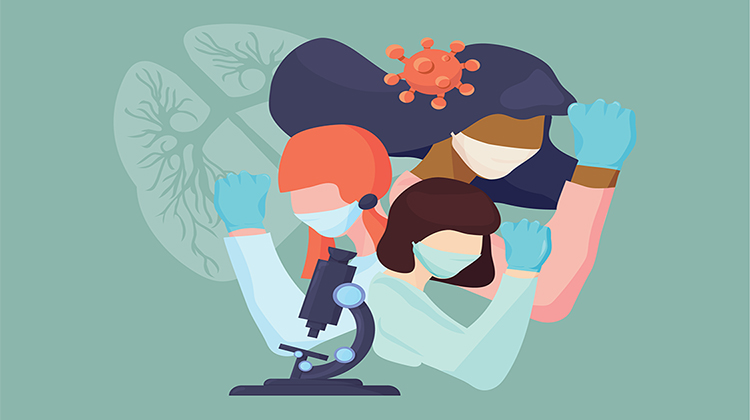International Day for Women and Girls in Science: Jane Kendrew
Posted: 13 February 2024 | Dr Jane Kendrew (Sygnature Discovery), Ellen Capon (Drug Target Review) | No comments yet
In light of the International Day for Women and Girls in Science, we had the privilege of speaking to Dr Jane Kendrew, Director of Translational Oncology at Sygnature Discovery. With over 30 years of drug discovery experience, she shares many insights, including her inspiration to pursue a career in STEM, her achievements in the field, and how women can overcome the challenges posed to them.

As a renowned expert in oncology, could you tell us what initially inspired you to pursue a career in STEM?
I come from a family of scientists. My father and brother were both engineers and my sisters — a chemist and a biochemist, so I suppose science was in my blood. At school, I always enjoyed the sciences more than any other subject — biology in particular. While I was studying for my “O” levels, a few things inspired me to follow the career path that I chose, two of which were most impactful. My biology teacher was the first: he was truly inspirational and not only brought biology to life but also supported and encouraged me to pursue a career in science. The second thing was a book on thalidomide and its discovery, which I found fascinating and inspired me to pursue a career in drug discovery.
In light of the International Day of Women and Girls in Science, which celebrates the achievements of women in STEM, could you share an example of a project or research that has been particularly impactful within your field?
I started my career in the early stages of the targeted approach to drug therapies. The project that led to gefitinib was in its latter stages and I was asked to work on follow-up projects, which resulted in many years of research into VEGFR inhibitors. This area of research was very “hot” at the time, VEGFR inhibitors were seen as having the potential to work across multiple tumour types. However, many assumptions were made and the commercial positioning of these candidate drugs did not lead to commercial success for the company. All this was happening alongside other advances in the field, and it was clear that as scientists we needed to get better at identifying which mechanisms to target and which patients to treat. Commercially, we needed to be driven by science.
Working on those projects was one of the best experiences of my career, I learnt so much about drug discovery. The team and teamwork were phenomenal. I got the opportunity to work with several inspirational scientists and, as part of that team, I achieved one of my career goals of working on a project that led to a marketed drug, Caprelsa.
Have you encountered any challenges or biases in your career journey that you had to overcome?
My career advisor at school told me to set my sights on a more realistic goal — maybe a job at Tesco rather than going to university and becoming a research scientist. Luckily, I ignored them! I’m not sure what was driving the bias: the fact that I was a woman or that not many people from my school went to university.
I’ve had a very successful career in science thanks to my capabilities, not because I’m a woman
In the workplace, I’m pleased to say I have never encountered challenges or biases related to my gender. I have been very lucky to work with people who have valued me for who I am and my capabilities. What is equally important to me however is that I don’t feel I have been given opportunities I shouldn’t have had, because of my gender. I’ve had a very successful career in science thanks to my capabilities, not because I’m a woman.
I have at times been subjected to academic bias, but my approach to this has always been to be open and honest, and let my abilities as a scientist and my track record speak for me.
In your opinion, what prevents women from attaining leadership roles within STEM fields?
Imposter syndrome is very prevalent in women. I still suffer from it at times! I feel women are far too quick to point out or focus on what they can’t do, or what they are not good at, rather than focusing on their skills and attributes and what they bring to an organisation.
Good leaders are confident that they used the best information available at the time, with the best intent, and they move on
Another common trait I have found in many women I’ve worked with is over analysing situations, which can complicate decision-making, especially when limited information is available. Leadership roles require decisions to be made where there is a level of uncertainty, and good leaders are confident that they used the best information available at the time, with the best intent, and they move on.
Self-doubt and fear of making the wrong decision can have a massive impact on your ability to fully achieve your potential.
Also, there seems to be an inbuilt drive in most women to achieve a good balance in their lives, and they are not naturally as single-minded as some of their male colleagues. This can hinder progression into leadership roles, too, as women can be seen as not being as committed as their male counterparts. I feel however that this way of working drives women to be more efficient and effective, more time- and delivery-focused.
How can we overcome these challenges that women face and encourage them to pursue their goals?
In schools, women are well represented in STEM and succeed in these subjects, so it seems like the focus needs to be post-education.
Organisational culture is critical in enabling women to pursue and achieve their goals
In the workplace, I feel that organisational culture is critical in enabling women to pursue and achieve their goals. Working in an organisation that plays to people’s strengths and acknowledges that everyone is different and they have a contribution to make can make a huge difference to someone’s ability to perform, succeed and hence progress their career. In this type of organisation, I feel women can achieve great things more easily. The focus is on their strengths, not their weaknesses. The environment is supportive and feels safe, encouraging you to be the best you can be.
Author bio
 Dr Jane Kendrew
Dr Jane Kendrew
Director of Translational Oncology
Jane has over 30 years drug discovery experience in the area of oncology therapeutics and is a highly experienced in vivo pharmacologist who has worked across a broad range of biology areas and phases of drug discovery. Her experience in applying in vivo pharmacology to drug discovery spans all phases from target validation to lead optimisation to support of clinical candidates.
Jane worked for AstraZeneca R&D Alderley Park for over 27 years and was responsible for leading the in vivo pharmacology group in the UK. On leaving AZ, Jane established a highly successful in vivo pharmacology CRO, specialising in bespoke support to SMEs and academics and their drug discovery projects. In 2020, Jane joined Sygnature Discovery to build the Translational Oncology Dept where she continues to apply her wealth of expertise and experience in drug discovery to novel areas of biology and therapeutic modalities.
She has a First Class BSc (Hons.) in Applied Biology and is an author on over 30 peer reviewed papers. During her career, she has significantly contributed to the success of a number of drugs within the AZ oncology portfolio.
Related organisations
Sygnature Discovery
Related people
Dr Jane Kendrew (Sygnature Discovery)


